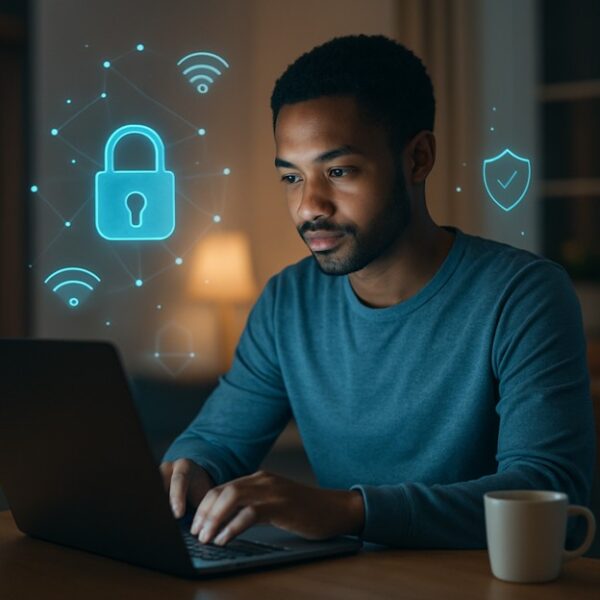We live in an age when everything about us—our clicks, searches, shopping carts, even idle scrolls—is quietly tracked and stored. For many Americans, the idea of “online privacy” feels like a quaint myth from the early internet days. Between smart speakers, ad trackers, and the fine print hidden behind every “I agree” button, it seems the modern web is built to watch us, not protect us.
But here’s the truth: privacy isn’t gone—it’s just more complicated. With a few smart habits and the right digital tools, anyone can reclaim a surprising amount of control online.
The New Normal: Data Collection Is the Default
Every app, website, and connected device today runs on data. Your phone shares your location; your browser stores cookies; your internet service provider (ISP) logs what sites you visit and how long you stay there. Companies don’t even need to “hack” your data—they simply ask for permission, often buried in legal jargon no one reads.
SPONSOR AD
In the U.S., most people underestimate how deep the tracking goes. Streaming platforms monitor what you pause and rewind. E-commerce sites watch how long you hover over a product. Even “free” email services analyze message content to improve ad targeting.
This invisible web of data collection isn’t inherently evil—but it’s overwhelmingly one-sided. Users rarely see where their data goes or how it’s used.
The result? We’ve traded privacy for convenience, often without realizing how much control we’ve given away.
Why Privacy Still Matters More Than Ever
Some argue that “privacy is dead” because, realistically, no one can opt out of every form of data collection. But privacy isn’t about hiding—it’s about having agency over what you share.
The stakes are higher than most people think. Identity theft reports in the U.S. have surged since the pandemic, with billions lost each year to online fraud. Data breaches routinely expose sensitive personal details from millions of accounts. Even more subtle are the social effects: algorithms shaping what we see, what we buy, and even what we believe.
Online privacy, in short, isn’t just a tech issue—it’s a matter of personal safety and freedom. And protecting it doesn’t require paranoia—just awareness.
Everyday Habits That Actually Protect You
Let’s start simple. Most people don’t need a full cybersecurity overhaul—they just need better digital hygiene.
- Use strong, unique passwords
A password manager can create and store unique credentials for every site. This prevents a single breach from compromising multiple accounts. - Review app permissions
Your flashlight app doesn’t need location access. Your weather app doesn’t need your microphone. Audit your phone’s permissions at least once a month. - Browse in private mode (when needed)
Incognito or private windows aren’t perfect—they mainly stop local storage of history—but they help reduce tracking when researching sensitive topics. - Keep devices updated
Many cyberattacks exploit old software. Regular updates quietly patch known vulnerabilities. - Be cautious on public Wi-Fi
Coffee shop or airport Wi-Fi might be convenient, but it’s also a hacker’s playground. Never access banking or private accounts on open networks unless you’re using a VPN.
How VPNs Strengthen Online Privacy
A VPN (Virtual Private Network) is one of the easiest tools for protecting your digital footprint. It encrypts your internet connection and routes it through a secure server, masking your IP address and location. This makes it far harder for third parties—like ISPs, advertisers, or hackers on public Wi-Fi—to monitor your activity.
VPNs also help you bypass regional restrictions on streaming or websites, but the real privacy value lies in encryption. It means your browsing activity can’t easily be read, logged, or sold. And unlike browser “private mode,” VPNs work across all apps and devices.
Not all VPNs are created equal, though. Look for providers with transparent privacy policies, strong encryption (like AES-256), and strict no-log commitments.
One such provider is X-VPN, which offers global servers, multi-device support, and a user-friendly interface ideal for both beginners and tech-savvy users. It’s designed to help users reclaim their privacy without sacrificing speed or simplicity.
Free VPNs: Proceed with Caution (and Options)
The phrase “free VPN” can be both a blessing and a red flag. Many “free” services cover their costs by collecting and selling user data—exactly the opposite of what you want in a privacy tool. However, some trustworthy providers offer limited free versions designed for accessibility rather than exploitation.
For users who can’t yet commit to a paid plan, X-VPN’s free VPN service is one of the few reliable options that still respects user privacy. It includes essential security features like encryption and anonymous browsing—without invasive logging. It’s a great starting point for anyone learning how VPNs work before upgrading to more robust coverage.
The key takeaway: don’t choose a VPN just because it’s free. Choose one that’s transparent.
Mindset Over Tools: Privacy Is a Habit
Tools can help, but they’re not a substitute for awareness. Privacy isn’t a one-time setup—it’s an ongoing mindset.
That means:
- Thinking twice before sharing personal details on social media.
- Checking URLs and sender addresses before clicking.
- Knowing that convenience (like “Sign in with Google”) often comes at the cost of more data sharing.
- Recognizing that every “smart” gadget you connect adds another node to your personal data web.
In short, staying private online isn’t about building digital walls—it’s about understanding the doors you leave open.
Conclusion: Taking Back Control
It’s easy to feel powerless in a world where data is the new currency. But taking back control of your online life doesn’t require a degree in cybersecurity. Start small: secure your passwords, update your devices, learn to recognize suspicious links, and use a VPN to add an extra layer of protection.
Privacy isn’t extinct. It’s evolving—and it’s still very much worth fighting for.
The more users demand and practice digital privacy, the more companies will be forced to respect it. Whether you’re guarding your identity, securing your Wi-Fi, or simply browsing without being profiled, the tools and habits are within your reach.
And if you’re ready to start, try using a VPN that actually puts privacy first. Because in the end, the best defense isn’t just software—it’s awareness, discipline, and the choice to protect what’s yours.








